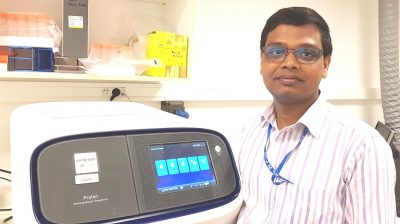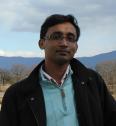This time Scientific Bangladesh has talked with Dr. Ismail Hosen.
He is an emerging cancer  researcher, working in University of Dhaka. He has shared many important and interesting insights in this interview. Let’s read what he shares.
researcher, working in University of Dhaka. He has shared many important and interesting insights in this interview. Let’s read what he shares.
1.Scientific Bangladesh: Would you like to tell us about your academic and research life? In other way, how would you like to introduce yourself to our readers?
Dr. Ismail Hosen: Currently, I am working as an assistant professor at the University of Dhaka, Bangladesh. I did my PhD from the German Cancer research Center (DKFZ) and recently completed a two years postdoctoral training at the International Agency for Research on Cancer (IARC), WHO. During my PhD, we showed that the telomerase reverse transcriptase (TERT) promoter mutations are most common somatic genetic alterations in melanoma, glioma and bladder cancer. We also showed that these somatic mutations, in conjunction with a common germline polymorphism located at the TERT promoter region, could modulate the risk of patient survival and recurrence in bladder cancer. In the last two years, we successfully developed the NGS and ddPCR based methods for comprehensive detection of TERT promoter mutations as a biomarker of bladder cancer in urine samples. As a molecular biologist, my vision has always been to use a systems level multi-omics approach to understand biological processes.
2.Scientific Bangladesh: What has made you researcher and/or teacher? In other way, what is the story behind your becoming researcher?
Dr. Ismail Hosen: I think, I like the independent thinking and curiousness involved with being a researcher. I have some big dreams to change the cancer research status in Bangladesh and by doing so, make positive impact to the lives of cancer patients.
3.Scientific Bangladesh: How do you manage fund for research? From where you get fund for research?
Dr. Ismail Hosen: I am still at very early stage of establishing my independent research groups and hence I have very little funds available. I am applying for numerous national and international funds for my group. Meanwhile, I have been successful to receive an international research grant (as a return grant from my postdoctoral fellowship) from the International Agency for Research on cancer (IARC), World Health Organization. I have also received one research grant from the UGC, Bangladesh as a PI. Moreover, I am acting as a co-PI in a number of research grants awarded by the Ministry of Science and Technology and Ministry of Education, Government of Bangladesh.
4.Scientific Bangladesh: Do you think, Bangladeshi researchers apply enough for international funds?
Dr. Ismail Hosen: I think No. This in part, is due to the thinking of many of our universities that they are academic universities, not research institutes. But the fact is that you cannot really separate academicians from researchers, these are two wheels of the same bicycle. I think or at least I feel that our universities and research organizations (except a few such as icddr,b) are not well-prepared to create an environment for the researchers to apply for international funds. For many of us, funding still means applying for charity, which is not the case at all. You have to have proper grants offices with infrastructure and expertise to make the system accessible to all researchers so that they can apply for international grants.
5.Scientific Bangladesh: Inadequate fund for research is a major problem in Bangladesh. What would you say in response to pointing fingers by many to this basic problem worldwide, not only in Bangladesh?
Dr. Ismail Hosen: Inadequate funding for research is a global problem and with the economy of Bangladesh and priorities set by the govt of Bangladesh, the problem associated with funding inadequacy just gets bigger. I think for Bangladesh, the problem is not inadequate funding only. I believe there is a lack of skills for proper management, planning and disbursement of the limited research funds available in Bangladesh. Rather than pointing fingers at what we have in terms of amount of funds for research, we should first make sure that we have a full proof plan set for allocating those limited funds for maximum output. This can be ensured by first acknowledging that we have this problem and then try to arrange discussion sessions with appropriate stakeholders to address this.
6.Scientific Bangladesh: What is your research area? What type of research facilities/ infrastructures you have or developed over years and how?
Dr. Ismail Hosen: My research focuses on better understanding of human cancer by utilizing multi-omics approaches. The ultimate goal is to identify clinically implementable molecular biomarkers for early detection and guiding therapy decision in low resource settings. Over the last 5 years since my PhD, we have established a number of fruitful national and international collaborations. Through these collaborations and some national level funding, we have set the basic facilities for collection and processing of tumor, blood and urine samples. We also have basic molecular biology facilities such as PCR machines, gel documentation system and RT-PCR machines in our department. We outsource our sequencing-based activities. We have a strong group of bioinformaticians to analyse multi-omics data.
7.Scientific Bangladesh: Tell us about your publications and patent, if any. Tell more about your most loved publication/s and/or patents.
Dr. Ismail Hosen: I have 35 peer reviewed publications with more than 1200 citations. I love all my publications a lot, they are like my own blood. Just for the sake of telling more about a publication, I would like to mention two articles: 1. Published in 2013 in PNAS: https://www.ncbi.nlm.nih.gov/pmc/articles/PMC3808633/ This article was the first article showing telomerase reverse transcriptase (TERT) promoter mutations as the most frequent mutations in bladder cancer and later we showed that these mutations are associated with poor survival of bladder cancer patients and also is a biomarker for disease recurrence. 2. Published in 2020 in ebiomedicine: https://pubmed.ncbi.nlm.nih.gov/32081602/ This is a gamechanger in early cancer biomarker studies. Our study demonstrates the potential of urinary TERT promoter mutations as early biomarkers for bladder cancer. We found that TERT promoter mutations could be detected up to 10 years before clinical diagnosis of bladder cancer in a subset of cancer patients using urine samples. This has a great potential for clinical utility for early detection of pre-clinical tumours and possibly for surveillance of patients for disease recurrence.
8.Scientific Bangladesh: Would you like to share your google scholar, LinkedIn or any other profile?
Dr. Ismail Hosen: Sure. Research Gate Profile: https://www.researchgate.net/profile/Ismail_Hosen
Linked In Profile:https://www.linkedin.com/in/ismail-hosen-b37aa538/
Google Scholar: https://scholar.google.com/citations?user=uxadbrUAAAAJ&hl=en
ORCID ID: https://orcid.org/0000-0003-0862-7206
9.Scientific Bangladesh: How many researchers (PhDs and Masters) have you developed by this time? In other words, share your supervising story.
Dr. Ismail Hosen: Until now, we have been able to publish two research articles from these master’s thesis. Two of my ex-master’s students are doing their PhDs in USA and Japan. One of them are working as Scientific officer at the BCSIR. One of them is currently finishing his Masters.
10.Scientific Bangladesh: What 1. qualities and 2. skills you expect in prospective researchers?
Dr. Ismail Hosen: Qualities: Motivation to work, sincere and flexible. Team player. Skills: Data analysis skills using R. Soft bioinformatics skills. Communication skills.
11.Scientific Bangladesh: What are the professional organizations of researchers you involved with? How important it for researchers to join such professional bodies?
Dr. Ismail Hosen: I am involved with the professional alumni association of the German Cancer Research Center (DKFZ), where my involvement gives me the opportunity to interact with peers and possible mentoring for younger researchers. In Bangladesh, I am not part of any scientific professional organisations as such.
12.Scientific Bangladesh: Do you think different professional bodies of scientists playing their due role in Bangladesh? What are your suggestions for the leading professional organizations of scientists?
Dr. Ismail Hosen: No. I think they need to build a blueprint for next 10-20 years and then bring the relevant people on board. They should stop looking around themselves and accept that expert peoples/researchers are there beyond their circles as well.
13.Scientific Bangladesh: How important is leadership ability to become a great researcher? Should researchers take leadership training? Did you ever get training on Leadership?
Dr. Ismail Hosen: I cannot imagine any researcher becoming successful without being a good leader. I strongly believe there should be professional leadership and communication training for researchers at all levels, from master’s student to the senior faculty members. I was lucky to be a part of two international organizations during my PhD and Postdoctoral fellowships. Their environment and leadership training makes makes researcher with good leadership skills..
14.Scientific Bangladesh: Would you like to add any more point for our readers?
Dr. Ismail Hosen: Dream big, work harder, be realistic.

